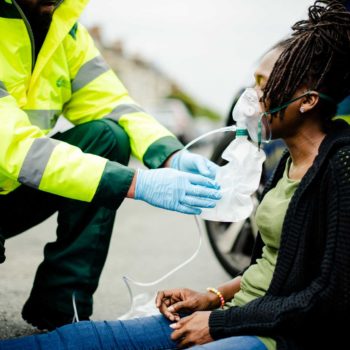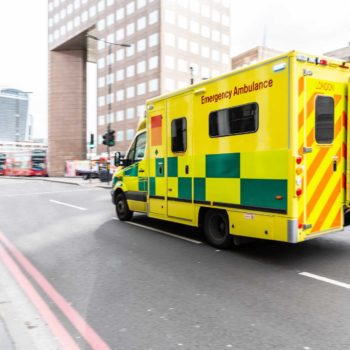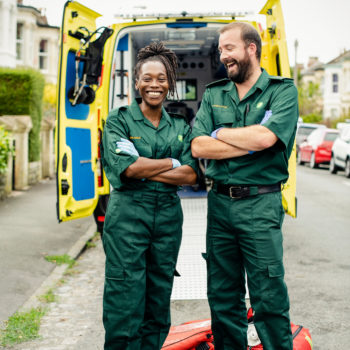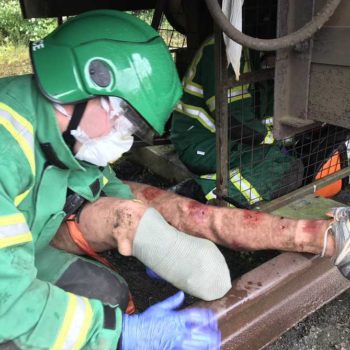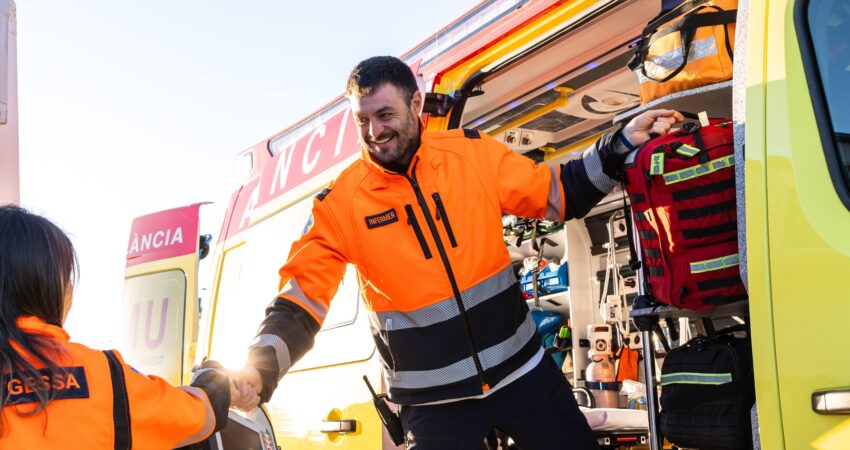
Paramedic case studies
In this section, we have put together a number of case studies of Paramedics to see how they got into the profession. One size doesn’t fit all, and these case studies are testaments to how there are multiple ways into the role:
Craig Merrick:
What made you want to become a Paramedic:
I always had an interest in emergency medicine.
How did you become a Paramedic:
I started in the ambulance service on patient transport service (PTS) and then worked my way up to paramedic within the trust.
Tell us more about the route you took to become a Paramedic (Experiences/Benefits…):
It’s been a very interesting career over the 27 years in the ambulance service. I’ve met some very interesting people and made some very good friends. There is not enough time for me to write down all my experiences and benefits here, but it takes hard work, and for me it was a roller coaster with lots of highs and some lows, but all made worthwhile in the end.
What advice would you give anyone who wants to become a Paramedic:
Be prepared to work hard, be grounded and learn from experienced people in and around the healthcare environment.
Lucy Sullivan:
What made you want to become a Paramedic:
Being attended by a lovely ambulance crew myself when I was 15, not having the grades to become a doctor, but wanting to be out and about.
How did you become a Paramedic:
University Diploma in Higher Education
Tell us more about the route you took to become a Paramedic (Experiences/Benefits…):
2 years at university, alternating 6-week university lectures and placements with mentors in ambulance stations all over Wales. Benefits of this were that I experienced life as a Paramedic in different settings such as city/rural. Cons were I didn’t feel ready/supported enough to be fully fledged when I first qualified (there was no Newly Qualified Paramedic program back then so at least this has been improved).
What advice would you give anyone who wants to become a Paramedic:
If you take the university route start taking the lead and making decisions early whilst your mentor is there to guide you.
Gavin Eynon:
What made you want to become a Paramedic:
I wanted a job that was going to be different every day.
How did you become a Paramedic:
University.
Tell us more about the route you took to become a Paramedic (Experiences/Benefits…):
Worked in Admin then Construction before applying to University for Paramedic Science HND. Initially rejected so I signed up and completed an access to health studies course at college. I was accepted onto the Paramedic Science course the following year 2010.
What advice would you give anyone who wants to become a Paramedic:
Be persistent and don’t be defeated by setbacks.
Antony Long
What made you want to become a Paramedic:
Wanted a challenging, fulfilling career.
How did you become a Paramedic:
Patient Transport Service (NEPTS) Emergency Medical Technician, Paramedic, HART.
Tell us more about the route you took to become a Paramedic (Experiences/Benefits…):
Good to develop into the role of paramedic over a number of years with a mix of training and experiential learning. Being placed in a busy city station was beneficial due to the volume/variety of patients.
What advice would you give anyone who wants to become a Paramedic:
Get as much patient contact as possible, experiential learning with a supportive mentor was the most beneficial way to gain competence and confidence in my role.
Stefan:
What made you want to become a Paramedic:
Career/ Stability/ Interesting work life.
How did you become a Paramedic:
Emergency Medical Technician (EMT) route through trust- Once in, applied for Paramedic pathway- IHCD & Diploma route with East Anglia University.
Tell us more about the route you took to become a Paramedic (Experiences/Benefits…):
Joined as EMT, once 12-month probation was over, applied to Paramedic pathway. Series of modules to be completed in own time- Last module was the IHCD Paramedic course (residential)
What advice would you give anyone who wants to become a Paramedic:
Life experience is beneficial in the role, ability to speak to patients, which can be difficult for young students. Local Community First Responder systems can give good insight to the world of prehospital care. I would advise Joining a local CFR group to see if that is a career you would like to develop
Jerry Humphreys:
What made you want to become a Paramedic:
Wanting to be able to help people in their hour of need.
How did you become a Paramedic:
DTS (Motorcycle & van courier, patient & staff transport), Patient transport Service, EMT, Paramedic, HART Paramedic 2ic.
Tell us more about the route you took to become a Paramedic (Experiences/Benefits…):
It took five applications for me to get from DTS to EMT despite gaining the highest marks in the entry exams first time. I spent nearly two years on PTS (now NEPTS) in the interim. I applied to be a paramedic the week before my EMT 12-month assessment. I did my BSc in prehospital care after becoming a paramedic.
What advice would you give anyone who wants to become a Paramedic:
If at first you don’t succeed, try and try again. People skills are as important as clinical skills and knowledge. Try not to lose sight of that.
Sarah Myles:
What made you want to become a Paramedic:
I have always had an interest in working in healthcare, but pre-hospital care was an area in which I was more interested in
How did you become a Paramedic:
University (BSc. Hon)
Tell us more about the route you took to become a Paramedic (Experiences/Benefits…):
Beginning the second year of my degree I was concerned that due to the lack of experience and exposure I had in pre-hospital care, I lacked confidence and competence. I decided to ask for a year out of uni to work on a bank contract as an ECA. I restarted my second year the next academic year feeling I had the opportunity to build on my weakness without any added pressure
What advice would you give anyone who wants to become a Paramedic:
Consider what learning styles suit you when considering which route to the role would work best
Gareth Denman:
What made you want to become a Paramedic:
I initially wanted to join the Police Service and became a Community First Responder (CFR) to gain more experience in helping people and helping in the Emergency/Public Services. I enjoyed the CFR role and the ability to help people, this led me to change career plans to become a Paramedic.
How did you become a Paramedic:
I completed a FdSc Paramedic Science course at Bournemouth University which allowed me to apply to become a Paramedic. Once a Paramedic, I later did a BSc (Hons) in Advanced Paramedic Practice to further my education and experiences.
Tell us more about the route you took to become a Paramedic (Experiences/Benefits…):
The time at Bournemouth University was intense, but I felt it was good for preparing you for the Paramedic role. I had the same mentors over long periods of time, this was great as it allowed them to know exactly what level I was at, and what to start working on next. Being in a busy city also provided a range of callouts covering various scenarios. This meant by the time I had qualified, I had experienced many different situations.
What advice would you give anyone who wants to become a Paramedic:
There are multiple routes into the role, so look at what you feel would best suit your learning needs and current circumstances. Many Ambulance Services and Universities hold open days which you can attend to see what is on offer. The first few years are going to be difficult and at times stressful, but getting the groundwork in is important. Look at volunteering roles, such as a CFR as this gives you great insight into the role, and working in other health care-based careers will help build the interpersonal and communication skills you need.
When you do get your foot on the ladder, be open and ready to listen to the information given to you, and always be ready to learn, as you will be learning new things throughout your entire career.

